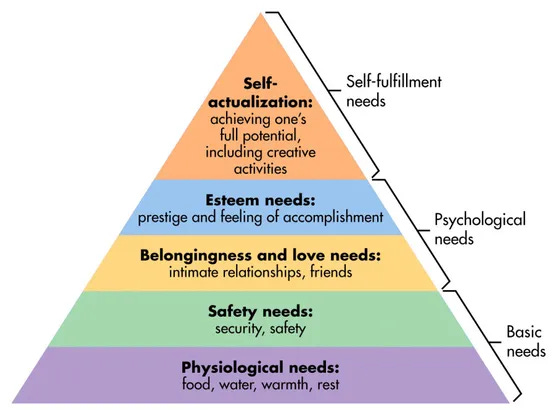Building for the world - from India
My take on how India can become a force of the future - Part 1/3
India, the fifth-largest economy by nominal GDP, with one of the lowest GDP across the world(139-142 based on the ranking that you look at), is the country that I come from. I truly believe that India has the capability to emerge as a stronger power in the world.
You may argue, but my standpoint is that, in spite of all the achievements that Indians like me boast about the country, it really hasn’t become what it should have been by now, even in the most conservative estimates. While it is easy for everyone to point out the political system and corruption as the core factors holding the country, my view is albeit a bit different.
Before getting into the next part, I want to highlight two vital concepts which I intend to reference often in my argument.
Maslow’s hierarchy of needs - Every human needs to fulfill needs from the lower level of the pyramid to satisfy the upper needs

Innate human curiosity - It is this curiosity that gets you hooked to Facebook, Instagram, TikTok, or Twitter so much that you keep looking at it every 15 minutes without even realizing - the curiosity to know what’s happening around. The human brain didn’t emerge all of a sudden. It took millions of years for the simple nerve in a jellyfish to evolve as a fully functioning brain that we have. Brains in humans are evolving but at a slower rate than we can notice in our lifetime, nor even in a Millenium. And this evolution had been made possible by the innate human curiosity.
Getting back - What has prevented India from realizing its potential, if I don’t put the entire blame on politics and corruption?
Evolution of the country’s economic ecosystem
The multi-cultural foundation of the country
India, emerging from the colonial suppression of the British Kingdom, decided to be self-sufficient going forward. This may sound absurd now but in the mid 20th century, this might have seemed to be an ideal standpoint for the country. My debate is not on why the leaders took that decision. We are many decades from those decisions, so, a post-mortem of the decision-making process is not the way forward for us right now. It took a major economic distress for the country to open up to the world in the 1990s- A blessing in disguise for the future.
As human beings, we evolve by making mistakes and learning from them. These learnings get passed onto subsequent generations and our evolution continues. Agriculture and cooking were passed on for thousands of generations over millennia. Manufacturing is passed on for centuries; Information technology, over decades.
Similarly, economic wisdom takes time for evolution, and India is not a country with a long history of freedom to go through the same evolution. You may point to China’s speedy evolution cycle even though it had a similar independence cycle with India. But China opened up two decades before us and caught hold of the globalization wave before India could enter the field.
This delayed evolution is the first major reason for where the country is right now.
India is one of the very few countries in the world that can boast a robust diversity in culture, language, and religion. In fact, I am proud that unity in India, despite diversity, is one of the strongest in the world. The recent events might suggest otherwise, but the overall trend is not that scary right now. I have no idea about the future but wish that unity stays intact. This unity has its own advantages which I intend to cover in the upcoming parts of the newsletter.
However, a mix of different groups comes with its own friction and makes the entire system to slow down. Internal migration, a key component for economic growth, is hindered in a multi-cultural ecosystem. Tensions between groups keep rising at regular intervals and these are unnecessary diversions that delay growth.
But, in my opinion, this can evolve and will take its own time to find the strengths of a diverse culture moving forward. The evolution here has been slow again and became a hindrance for the country to get the ball rolling in economic development.
As these factors don’t seem to be ending in the near future, then why am I arguing that India is entering into a phase where it can build for the world? And what can it build for the world? More in the upcoming series.
Read part 2 here
Part 3 here
Disclaimer: I don’t claim that these opinions are right, I just claim that these are mine! I have taken the liberty to use data, without fact-checking, from what I remember through reading numerous news articles, books, renowned scholar opinions, and debates.

Nice one